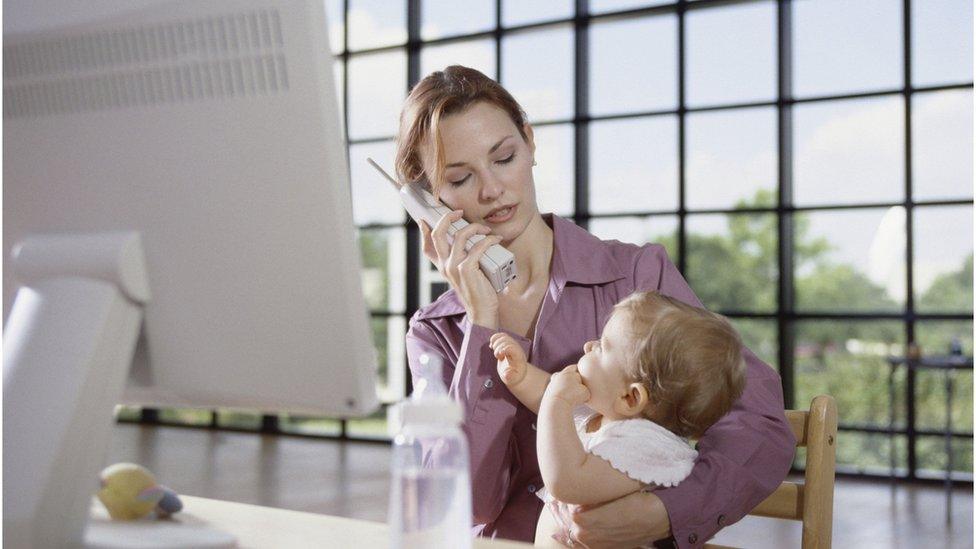Six ways to tackle the gender pay gap
- Published

Women in the UK who return to work after having a baby continue to earn less than men for many years afterwards, according to a new report. Part-time working, missed promotions and less experience are all contributing to what is being branded a "mummy tax".
So what could be done to level the playing field?

Enforce paternity leave

Arguably, the best way to make businesses friendlier towards women is to make dads take more paternity and shared parental leave.
When dads step in to cover the childcare, mums can return to work, work more hours and earn more money. It also ensures workplace flexibility is an important issue for men too.
In some countries the idea of paternity leave has yet to take hold, but in Sweden it has been encouraged since 1974 and there is now also a new incentive for dads to spend a full three months at home.
A "daddy quota" of 90 days' leave is allocated solely to the father on a use-it-or-lose-it basis. If the father doesn't take the time off work, then the couple as a whole lose the three months' paid leave.
Shared parental leave was introduced in the UK in 2015, but not all parents qualify.

Subsidise childcare
The cost of childcare can be crippling for many families with an average part time nursery place now costing up to £6,000 a year.
For mothers on low wages, after nursery and travel costs it can be barely worth working, with the government only covering the costs of some childcare once a child turns three.
The Women's Equality Party is calling for state childcare help to start as soon as paid parental leave is over.
"Of course, lots of mothers and fathers want to spend time at home with their young families. But at least 600,000 stay-at-home parents would prefer to work if they could afford to do so," says WEP leader Sophie Walker.
The party says a free part-time nursery place should be available from when a child reaches nine months, with extra hours on top of that capped at £1 an hour.
"Without bold changes women will keep dropping out of the workplace and men will keep dropping out of their families. This is bad for our economy and our society," Ms Walker says.

Allow babies in the office

When Italian politician Licia Ronzulli took her six-week-old baby to the European Parliament in September 2010, the pictures caused a media stir.
She said her decision to bring baby Vittoria in to vote was not a "political gesture but a maternal one" because she was breastfeeding. Since then, photos of the MEP with her daughter have documented the little girl growing up, external attending a number of parliamentary votes.
In the US, companies have started to take note, with a "babies at work" policy becoming a growing trend.
Carla Moquin founded the Parenting in the Workplace Institute after being frustrated by the lack of options when she had to go back to work four weeks after giving birth.
She says clear rules and a formal structure mean the office does not become a chaotic scene.
Provisions such as making sure parents agree to respond quickly to any cries and setting a "baby free zone" for colleagues who want it are essential. Parents must also formally agree not to let their childcare responsibilities interfere with their ability to do the job.
In the UK, taxi firm Addison Lee also experimented with the idea, while investment banking firm Goldman Sachs is one firm that helps parents back to work with an on-site office creche.
The company says it offers emergency back-up care, an infant transition programme for parents returning to work following maternity leave and full-time care for children up to age three.

Let parents work from home

The financial burden of running a childcare facility means not all businesses can afford to offer such benefits.
But in a world where email, mobile technology and communication are king the other obvious option appears to be working from home.
The Fawcett Society, which campaigns for gender equality, has called on employers to advertise jobs at all levels as flexible, part-time or a job share unless there is a strong business case not to.
Meanwhile, the TUC says flexible working has real benefits for businesses and their workforces with employees being more dedicated and productive.
But beware. Not being "seen in the office" may affect a person's chances of promotion, and result in a smaller pay rise and lower performance evaluations than office-based peers, according to research by the London Business School and the University of California.

Give women a pay rise

It might sound obvious, but why not just plug the gender gap by paying women more?
In June, the University of Essex announced it was to raise female professors' pay with a one-off salary hike to bring their average pay level with their male colleagues.
Vice-chancellor Anthony Forster said other steps aimed at improving women's promotion chances had failed to close the pay gap at professorial level.
And the university is not alone. Brainlabs, a mathematical marketing agency based in London, also voted to eliminate the overall pay gap by increasing women's salaries by 8.6%.
But does this strategy not offend male colleagues? Brainlabs director Sophie Newton says not, claiming none of her male employees had complained about the new policy.
"I definitely do not think it is unfair on men. Women have been facing issues for centuries - it's only now that we are starting to talk about how we can make the workplace a much more equal and happy place."

Increase the value of low paid work
While those in big business are being pushed to publish what their employees are earning, small companies that tend to offer jobs at the bottom of the pay scale are not being so closely scrutinised.
Research shows women tend to cluster in lower paid jobs - almost two-thirds (63%) of those earning £7 per hour or less are female.
According to the Fawcett Society, jobs traditionally done by women, such as cleaning, catering and caring, are "undervalued and paid less than jobs traditionally done by men, such as construction, transportation and skilled trades" meaning "men's work" is generally given a higher value both socially and economically.
The charity is encouraging employers to pay the living wage and support women to progress to higher paid jobs by using targets.
- Published6 January 2016

- Published19 May 2016

- Published19 November 2015

- Published2 February 2016

- Published15 June 2016

- Published3 June 2016
